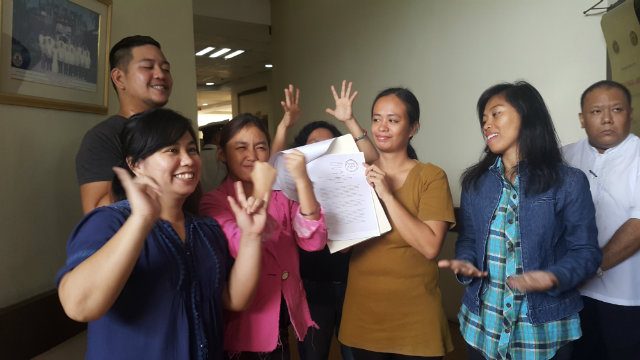SUMMARY
This is AI generated summarization, which may have errors. For context, always refer to the full article.

CEBU, Philippines — Abegail Montejo, a 40-year-old deaf person, walks out of the hospital after the successful removal of her uterus over a benign tumor she had for 3 years. She went home without spending a single centavo.
Aside from the free hospital services, she was also accompanied by a sign language health care interpreter for her to fully understand important information on her operation up to her discharge.
All these efforts were made possible because of the collaborative efforts of the Philippine Accessible Deaf Services, Incorporated, in partnership with the Department of Health Regional Office VII and the Vicente Sotto Memorial Medical Center’s Cervical Cancer Prevention Center.
“I am thankful for the people from DOH who supported me,” said Montejo. “Two years ago, I did not fully understand about my health condition until I got an interpreter recently who told me that I needed to be operated [on]. I was afraid because no one communicates to me in sign language in the hospital and I am poor.”
The health care system is often denied to deaf Filipinos due to language barriers. (READ: Perils of being a sign language interpreter)
Filipino Sign Language (FSL) users are often denied access to health care since most health care providers do not provide qualified sign language interpreters.
Complicating this further is the fact that individuals vary in hearing loss levels and communication styles. As a result, a deaf person does not benefit from health care programs. Some also struggle to find health care practitioners who can effectively communicate with them.
Beyond hearing impairment
“For more than two decades, there has been a global movement of seeing deafness as a culture beyond hearing impairment,” said Janice Aparri, president of Cebu’s Deaf Community.
Aparri said that “the community of deaf individuals, as a cultural linguistic minority, has become visible and accepted in the global circles of advocacy.”
“Such a paradigm is quiet widespread and already embedded in the Filipino Deaf community. Unfortunately, our government policies, particularly in education, health care, employment, legal system and broadcast media has not kept up with the development of this progressive philosophy,” she added.
In February 2014, Senator Bam Aquino filed bills that support the right to language, cultural identity, and access to information of the Filipino deaf community.
The Filipino Sign Language Act in Broadcast Media requires the use of FSL insets for local news programs, amending the Magna Carta of Persons With Disabilities. Meanwhile, the Filipino Sign Language Act declares FSL as the Filipino deaf’s national language and the government’s official language in all transactions involving the deaf. The proposed bill also mandates the use of FSL in schools, broadcast media and workplaces.
All these bills, however, are still pending at the Senate committees on public information and mass media and on education, arts and culture chaired by Senators Grace Poe and Pia Cayetano, respectively.
In the House of Representatives, an FSL bill was authored by ACT Teachers party-list Representative Antonio Tinio in 2013.
There have been no attempts, however, to push these bills. It seems that not much importance has been given to the issues that bills propose to address despite urgent calls from the deaf community and deaf advocates.
Ironically, their requests have fallen on deaf ears.
Hope

But not all hope is lost.
In July 2015, the Cebuano deaf community celebrated as they found allies. The Cebu City Government Council and the Cebu Provincial Government formally passed a position paper recognizing FSL as the Filipino deaf community’s national sign language. They also declared deaf Filipinos as a cultural linguistic minority.
The position paper also urges legislators to pass pending bills on FSL.
“No less than our city upholds the fundamental human rights principles, with the passage of our Anti-Discrimination Ordinance that promotes tolerance and respect for diversity and individual differences,” said Councilor Alvin Dizon, who sponsored the filing of the position paper and authored the Cebu City’s Anti-Discrimination Ordinance.
“Our Deaf brothers and sisters have to be fully protected against lack of recognition, acceptance and participation,” Dizon added.
He said that “sign language is at the core of the full enjoyment of the human rights of the Deaf people because accessibility possible; and accessibility guarantees participation in the affairs of the society.”
A local ordinance requiring all local TV news programs to provide sign language inset interpreters is also currently on the works. It will be authored by Councilor Lea Japson.
The recognition of FSL may not be a political issue, but it affects more than half a million Filipinos. – Rappler.com
Add a comment
How does this make you feel?
There are no comments yet. Add your comment to start the conversation.